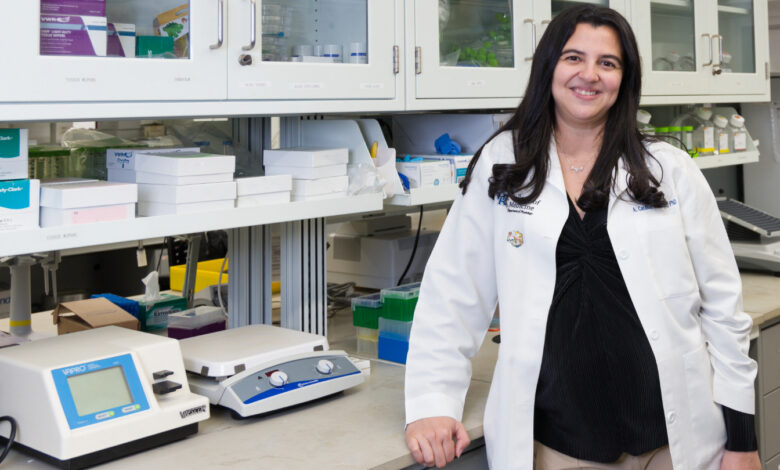Dad’s backyard lessons inspired this hearing scientist to learn


biology: The study of living things. The scientists who study them are known as biologists.
biomedical: Having to do with medicine and how it interacts with cells or tissues.
biomedical engineer: An expert who uses science and math to find solutions to problems in biology and medicine; for example, they might create medical devices such as artificial knees.
biomedical engineering: Combining engineering and biology to aid human health. Professions in this field develop artificial limbs, use biotechnology to produce new drugs and develop models to understand how diseases work.
blood vessel: A tubular structure that carries blood through the tissues and organs.
cell: (in biology) The smallest structural and functional unit of an organism. Typically too small to see with the unaided eye, it consists of a watery fluid surrounded by a membrane or wall. Depending on their size, animals are made of anywhere from thousands to trillions of cells. Most organisms, such as yeasts, molds, bacteria and some algae, are composed of only one cell.
code: (in computing) To use special language to write or revise a program that makes a computer do something. (n.) Code also refers to each of the particular parts of that programming that instructs a computer’s operations.
coding: (in computing) A slang term for developing computer programming — or software — that performs a particular, desired computational task.
cyst: A group of cells that form a type of bubble-like shell or sac. Some cysts develop as a result of disease or tissue damage. Others may develop as a normal, protective feature during certain phases of a parasite’s maturation.
electronics: Devices that are powered by electricity but whose properties are controlled by the semiconductors or other circuitry that channel or gate the movement of electric charges.
engineering: The field of research that uses math and science to solve practical problems. Someone who works in this field is known as an engineer.
feedback: A response or assessment that follows some a particular act or decision.
field: An area of study, as in: Her field of research is biology. Also a term to describe a real-world environment in which some research is conducted, such as at sea, in a forest, on a mountaintop or on a city street. It is the opposite of an artificial setting, such as a research laboratory.
grad school: Short for graduate school. A university program that offers advanced degrees, such as a Master’s or PhD degree. It’s called graduate school because it is started only after someone has already graduated from college (usually with a four-year degree).
hair cells: These are the sensory receptors inside the ears of vertebrates that allow them to hear. These actually resemble stubby hairs.
high school: A designation for grades nine through 12 in the U.S. system of compulsory public education. High-school graduates may apply to colleges for further, advanced education.
immunology: The field of biomedicine that deals with the immune system. A doctor or scientist who works in that field is known as an immunologist.
insight: The ability to gain an accurate and deep understanding of a situation just by thinking about it, instead of working out a solution through experimentation.
internship: A training program where students learn advanced professional skills by working alongside experts. People who participate in these training programs are called interns. Some intern in medicine, others in the sciences, journalism or business.
major: (in education) A subject that a student chooses as their area of focus in college, such as: chemistry, English literature, German, journalism, pre-medicine, electrical engineering or elementary education.
mentor: An individual who lends his or her experience to advise someone starting out in a field. In science, teachers or researchers often mentor students or younger scientists by helping them to refine their research questions. Mentors also can offer feedback on how young investigators prepare to conduct research or interpret their data.
moon: The natural satellite of any planet.
network: A group of interconnected people or things. (v.) The act of connecting with other people who work in a given area or do similar thing (such as artists, business leaders or medical-support groups), often by going to gatherings where such people would be expected, and then chatting them up. (n. networking)
PhD: (also known as a doctorate) A type of advanced degree offered by universities — typically after five or six years of study — for work that creates new knowledge. People qualify to begin this type of graduate study only after having first completed a college degree (a program that typically takes four years of study).
physics: The scientific study of the nature and properties of matter and energy. Classical physics is an explanation of the nature and properties of matter and energy that relies on descriptions such as Newton’s laws of motion. Quantum physics, a field of study that emerged later, is a more accurate way of explaining the motions and behavior of matter. A scientist who works in such areas is known as a physicist.
physiology: The branch of biology that deals with the everyday functions of living organisms and how their parts function. Scientists who work in this field are known as physiologists.
protein: A compound made from one or more long chains of amino acids. Proteins are an essential part of all living organisms. They form the basis of living cells, muscle and tissues; they also do the work inside of cells. Antibodies, hemoglobin and enzymes are all examples of proteins. Medicines frequently work by latching onto proteins.
theory: (in science) A description of some aspect of the natural world based on extensive observations, tests and reason. A theory can also be a way of organizing a broad body of knowledge that applies in a broad range of circumstances to explain what will happen. Unlike the common definition of theory, a theory in science is not just a hunch. Ideas or conclusions that are based on a theory — and not yet on firm data or observations — are referred to as theoretical. Scientists who use mathematics and/or existing data to project what might happen in new situations are known as theorists.
tool: An object that a person or other animal makes or obtains and then uses to carry out some purpose such as reaching food, defending itself or grooming.
undergrad: Short for undergraduate, which is a student at a two- or four-year college.



